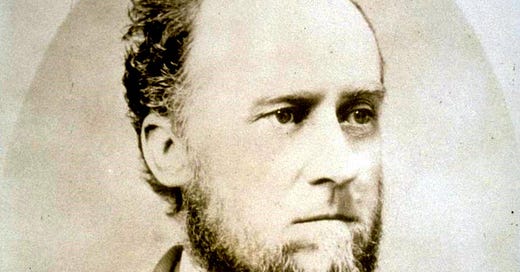Chapter 23: La Plaçage —Mary Ellen Pleasant, Lizzie Ralston, William Ralston
May, 1860 — San Francisco, California
Mary Ellen Pleasant, Lizzie Ralston, William Ralston
When William Ralston hired me, I knew I’d hit the jackpot. Anything I needed to know, politically or financially, I was going to be able to get from the Ralston and the constant flow of high powered San Franciscans circulating through his house on Rincon Hill.
But building Ralston’s trust was going to take time. So I started with his wife, Lizzie.
As the Ralstons were always entertaining, naturally I spent a good deal of time with Lizzie, planning for their frequent, sumptuous dinners and parties. She was tiny, dark-haired and energetic. But she interested me because she was so unhappy. Unhappy, and lonely. That’s always something I can work with.
And I saw from the start: Ralston and Lizzie had a strange relationship. I liked that. It opened up all kinds of ways in. I couldn’t watch Ralston all the time. But I could do the next best thing. I could enlist Lizzie to watch him for me.
I did my research. It wasn’t difficult to learn more. Their honeymoon had been abundantly detailed in the papers. A dozen people went along with them, including a reporter to capture everything for the society pages. Ralston put the whole wedding party on a pack train to Yosemite and Calaveras to see the giant Sequoias. The women wore bloomers to ride astride, a right scandal.
A lark, you might say. A rich man’s idea of an outrageous party. All of San Francisco was mad for Yosemite, it was true: those immense waterfalls and grand cliffs. And Ralston was devoted to all things California.
Yosemite, by Carleton Watkins
But it struck me as odd. There had been no private accommodations, it was all camping. And the bride rode in a separate carriage from the groom.
So I dug deeper.
I learned Ralston had made it plain when proposing to Lizzie that he had pledged eternal love to another: a granddaughter of Vanderbilt. Yes, that Vanderbilt.
And Louisa Vanderbilt happened to be dead.
When Ralston and Louisa became engaged against the will of her family, Louisa’s parents sent her to Europe hoping to break up the engagement. On the journey she’d contracted fever and died. Apparently Ralston was so devastated he hired a gardener to keep roses growing year-round on poor Louisa’s grave.
And later, when he began courting Lizzie, he flat-out told Lizzie’s uncle and guardian, William Fry, that he could never love Lizzie as he had Louisa, but if she was willing, he would love her as best he could.
Lizzie accepted.
Now it strikes me that that’s a woman who needs a friend.
And I had one in mind.
I said that in San Francisco there were only three places for good families to live. Well, besides the endless rounds of visiting each other’s houses, there were only a few public places respectable women could go unaccompanied. The fine hotels on Montgomery Street had created their own promenades for women to shop in safety —and keep them spending, of course.
I knew just what days Lizzie liked to shop. So when we were ready, I made sure we there, walking Montgomery on a glorious day, where we “accidentally” came face to face with Lizzie.
“Good day, Mrs. Ralston,” I said, feigning pleased surprise.
Lizzie’s eyes lit up. “Why hello, Mrs. Smith. Such a fine day to be out.”
“It surely is, Mrs. Ralston.” It was California. Compared to the South, the weather was permanently splendid.
I turned to the impeccably dressed young lady beside me. “May I introduce Miss Lisette Flohr? Just arrived from New Orleans.”
“It’s a pleasure, Mrs. Ralston.” Lisette said demurely, and dropped a beautiful curtsy, just like I’d taught her. We’d been working together for months now, and Lisette was a good pupil, a natural actress. All women are. We have to be.
Lizzie’s face had clouded in sympathy. “Mercy, that terrible journey. Through Panama?”
“Via your own husband’s steamship company, I believe.” Lisette answered. She had that aristocratic Southern girl accent down. We’d worked on that, too. She added earnestly, “You must thank him kindly for me. I had heard such fearful stories, but my trip was truly tolerable.”
Lizzie nodded, accepting the compliment. “I’m so glad. And you were acquainted with Mrs. Smith in New Orleans?”
Lisette lowered her eyes modestly. “Mrs. Smith worked for my family, since I was a child.” She shot me an adoring glance, a nice touch, I thought. “Why, she was a second mother to me, that’s all.”
Lizzie turned to smile on me benevolently. “Mrs. Smith is an absolute treasure.”
That was me. An absolute treasure.
Then Lizzie reached for Lisette’s hands, pressing them in hers. “You must come to tea. And we are having a party next week…”
And now I was the one smiling—inside. When you knew who’s who, it was just that simple. Unhappily married women love to matchmake. I figured it wouldn’t take Lizzie any time at all to get to it.
La Plaçage, San Francisco style.
Keep reading:
Read After the Gold Rush from the beginning:
Share this post:





